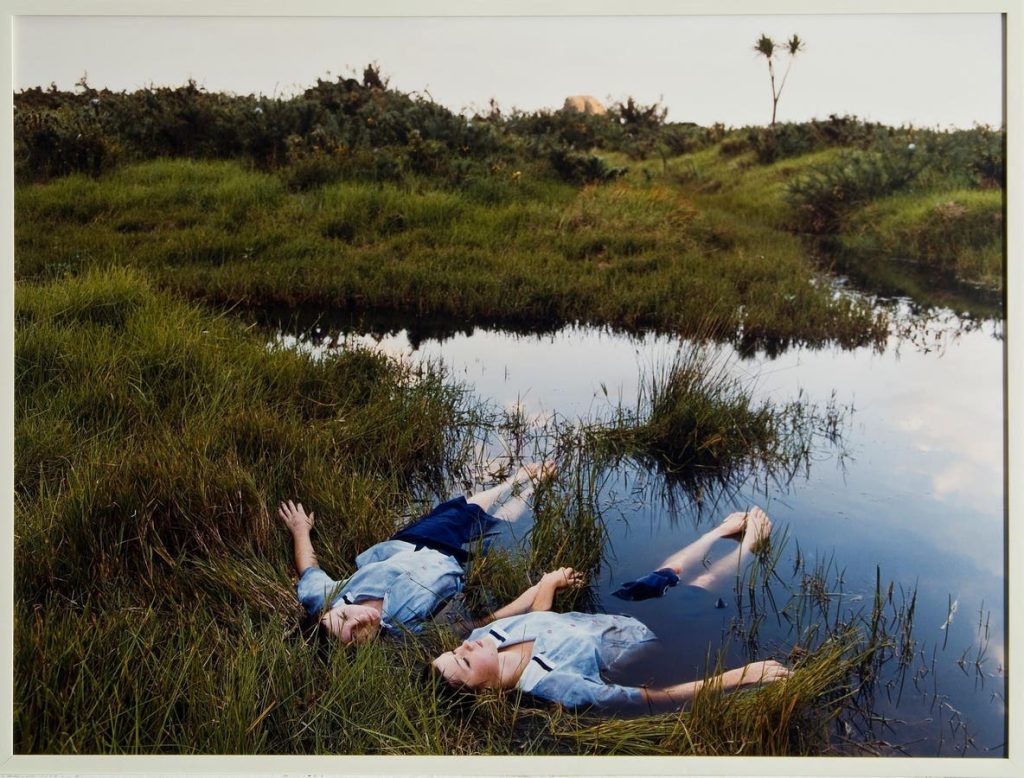An exhibition at the National Museum of Women in the Arts in Washington, DC, explores modern and contemporary women artists’ use of the uncanny as a feminist strategy and social critique.
“Grassland Drifters” (2001), by Justine Kurland
NMWA
On display through August 10, it features almost 70 works by over 30 artists, ranging from Louise Bourgeois, Leonora Carrington, Meret Oppenheim and Remedios Varo to Laurie Simmons and Gillian Wearing.
Named for a term, the museum said, “popularized by Sigmund Freud to describe the unsettling psychological experience of something both familiar and foreign, Uncanny is the first exhibition to examine this concept through a feminist lens.
“Organized around the themes of surreal imaginings, unsafe spaces and the phenomenon of the uncanny valley,” the exhibition features painting, sculpture, photography, works on paper and video.
The exhibition opens with the early 20th century Surrealist movement, in which, the museum said, “artists drew on Sigmund Freud’s writings about the unconscious to create strange, dreamlike imagery. On view are works by Leonora Carrington (1917–2011), who explored themes of identity, metamorphosis and transformation in playful yet inhospitable realms. In her Ship of Cranes (2010), menacing birds with elongated, piercing beaks glide ominously in a bird-boat hybrid, pointing to Carrington’s interest in ideas of rebirth and the afterlife found in ancient mythologies.”
Other works address physical trauma as well as the body’s emotional and physical relationship to the unknown.
According to the museum, the “term ‘uncanny,’ or unheimlich in German, translates to ‘not-at-home,’ a reference to the feeling of being in an unfamiliar space with hidden secrets. With this in mind, the haunting, 15-foot-wide sculpture 019 (2007) by Berlinde De Bruyckere (b. 1964) presents fragments of wax-covered wood within an antique glass vitrine. The objects appear startlingly animate, as if bodies and ethnographic specimens are hanging on display. Julie Roberts (b. 1963) creates unsettling images of medical instruments or facilities floating in saturated color. In Gynaecology Couch (1992) and Sigmund Freud Study (1998), she examines society’s spaces and methods of exercising power, particularly over the female body.
“In her series ‘Rewriting History’(2017), Fabiola Jean-Louis (b. 1978) photographs carefully staged, seemingly innocuous portraits of close acquaintances wearing elaborate period costumes typical of upper-class European women, while disturbing images of racial and sexual violence are hidden within the background or details of a dress, reminding the viewer of the lineage of violence. The haunting video Collapse (2013) by Sama Alshaibi (b. 1973) uses the honeybee as a metaphor for refugees displaced by environmental changes; while nations wage war over power, resources and territory, insects and humanity alike face impending extinction.”
Another section of the exhibition focuses on the “uncanny valley,” a term coined by the Japanese roboticist Masahiro Mori in 1970. This “describes the strange sensation evoked by physical objects that very closely—but not completely—resemble living people. These images typically contain small peculiarities that signal to the viewer that something is not quite natural.”
“The enigmatic, darkly humorous and psychologically tense artworks in Uncanny give form to women artists’ powerful expressions of existential unease,” said NMWA associate curator Orin Zahra, who organized Uncanny. “Rather than comfort and soothe, these ghostly and fantastical figures haunt the unconscious. Instead of picturesque images, artists offer disquieting spaces that unsettle the viewer. In focusing on the ambiguity between reality and fiction, artists explore increasingly blurred lines between the artificial and eerily human.”

